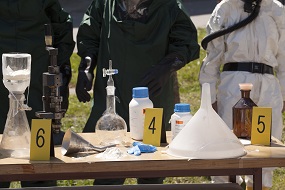The methamphetamine epidemic is alive and well in the U.S., and it could be coming to a storage unit near you. Consider just two recent cases:
• A woman in Warren, Michigan, was recently arraigned on narcotics charges stemming from a methamphetamine lab uncovered last weekend at a Warren storage unit.
• A young research assistant in the biology department at the University of Minnesota is accused of running a meth lab out of a storage unit in St. Paul, MN.
Self-storage facilities have become a favorite target for operators of clandestine meth labs. With minimal law enforcement surveillance of these sites, storage units can make for easy production of the drug. Plus, it’s easy to dispose of the toxic waste in onsite dumpsters.
The combination of dangerous chemicals, noxious fumes and lack of ventilation create high risk for fires and explosions. On top of that, every pound of methamphetamine produced leaves behind five pounds of toxic waste. If you’re unfortunate enough to have a meth lab at your facility, clean-up costs will take a big bite out of your profits. According to the DEA, it could run you approximately $4,500 per storage unit initially, and ultimately could cost you tens of thousands of dollars when other ancillary costs are considered.
Bottom line: This is a highly volatile and growing risk to your storage business you can’t afford to ignore.
The worst thing you can do is be apathetic or negligent about dealing with this threat. That makes your business an easy target, and before you know it, your property is worthless. But if you educate yourself and stay vigilant about protecting your business, the meth cookers will move on.
How do you know if a meth lab has moved into your self-storage facility? Watch for these red flags:
• Unusual, strong odors (cat urine or chemicals)
• Tenants who pay in cash
• Increased traffic at night or at unusual times
• Excessive trash including antifreeze containers, fuel cans, red chemically-stained coffee filters, drain cleaner, glass containers, and duct tape
10 tips to protect your self-storage business:
1. Ask questions. Find out why tenants chose your facility over others.
2. Follow your instincts. If you get the feeling a potential client is acting suspicious, ask yourself if it’s worth the risk to rent to this person.
3. Use a clearly worded contract forbidding storage of hazardous materials and any criminal activity.
4. Require signatures, ID, and license plate numbers of tenants and anyone who will access their units.
5. Offer to assist local law enforcement with canine training by allowing them access to your property, and let your tenants know you allow drug-sniffing dogs on the property.
6. Learn to recognize possible meth users. Signs include nervousness, irritability, sweating, anxiousness, dilated pupils, teeth grinding, burnt fingers, and bad teeth.
7. Patrol the facility regularly and check for unusual and excessive waste, strange odors, unusual liquids, and suspicious activity.
8. Check traffic logs to ensure that tenants aren’t staying in the unit at irregular times and/or for extended periods of time.
9. If you suspect a meth lab at your facility, don’t double-lock the unit or confront the suspects. Call authorities immediately.
10. Offer all tenants self-storage insurance to help protect their contents from the risk of fire and other damages.
Contact us to learn more about our affiliate programs for self-storage insurance as well as business insurance for companies in the relocation industry.

